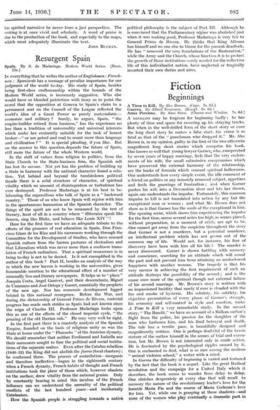Resurgent Spain
Spain. By S. de Madariaga. Modern World Series. (Benxi. 21s.)
IN everything that he writes the author of Englishmen : French- men Spaniards has a message of peculiar importance for our judgment of the world to-day. His study of Spain, besides being first-class craftsmanship within the bounds of the Modern World series, is immensely suggestive. Who elie would have so blended patriotism with irony as to point the moral that the opposition at Geneva to Spain's claim to a permanent seat on the Council of the League reflected the world's idea of a Great Power as purely materialistic— economic and military ? Surely, he argues, Spain, " the empire-builder retired from business," has the experience no less than a tradition of universality and universal interests which make her eminently suitable for the task of honest broker—" or are petrol and coal to count more than language and civilization ? " It is special pleading, if you like. But on the answer to this question depends the future of Spain, still more the future of the whole Western world.
In the shift of values from religion to politics, from the State Church to the State-business firm, the Spanish salt has lost its savour. Not yet has the problem of building up a State in harmony with the national character found a solu- tion. Yet behind and beyond the tumbledown political fagade there is a solid structure of character, of spiritual vitality which no amount of disintegration or turbulence has ever destroyed. Professor Madariaga is at his best in be- labouring the supercilious who talk of Spain as a " backward country." Those of us who know Spain will rejoice with him in the spontaneous humanism of the Spanish character. The things of the spirit are not to be measured by the test of literacy, least of all in a country where " illiterates speak like Seneca, sing like Blake, and behave like Louis XIV " !
Here for the first time we have an adequate tribute to the efforts of the pioneers of real education in Spain, Don Fran- cisco Giner de los Rios and his successors working through the Committee for the Development of Studies, who have rescued Spanish culture from the barren pastures of clericalism and that Liberalism which was never more than a mediocre trans- lation of French radicalism. That a spiritual renascence is in being to-day is not to be denied. Is it not exemplified in the author of this book ? Part II, besides an analysis of the way in which the new leaven is working in the universities, gives honourable mention to the educational effect of a number of unusually live and literary newspapers. It helps us to "place" Joaquin Costa, Angel Ganivet, and their descendants, Miguel de Unamuno and Jose Ortega y Gasset, essentially the prophets of the new age. Nor has economic development lagged behind in this national resurgence. Before the War, and during the dictatorship of General Primo de Rivera, material progress has made such strides as Spain had not known since the reign of Charles III. Professor Madariaga looks upon this as one of the effects of the closed imperial cycle, " the pruning of the old Iberian oak." He may very well be right.
In the first part there is a masterly analysis of the Spanish Empire, founded on the basis of religious unity as was the State at home under the " Pharaohs " of the Austrian dynasty. We should remember that neither Ferdinand and Isabella nor their successors sought to fuse the political and social institu- tions of the separate realms. Even after the Catalan rebellion (1840-52) the King did not abolish the fueros (local charters)'; he confirmed them. The process of assimilation—inorganic and therefore ineffective—began in the eighteenth century when a French dynasty, French habits of thought and French institutions took the place of those which, however obsolete on the surface, drew vitality from the national genius. Only by constantly bearing in mind this incubus of the French influence can we understand the unreality of the political conflicts of the list hundred years—and incidentally catalanism.
How the Spanish people is struggling lowards a native
political philosophy is the subject of Part III. Although he is convinced that the Parliamentary regime was abolished just when it was making good, Professor Madariaga is very fair to General Primo de Rivera. He thinks that King Alfonso has himself and no one else to blame for the present deadlock. He has " removed the very foundations of the Restoration," while the Army and the Church, whose function it is to protect the growth of those institutions sorely needed for the collective Iife of this individualist nation, have neglected or tragically inverted their own duties and aims.


































 Previous page
Previous page